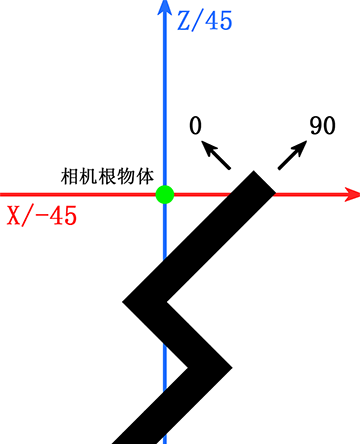跳舞的线官方相机跟随在直角坐标系的实现方式¶
- 本文所使用的Unity版本为2021.3.14f1c1
- 官方常用坐标系沿-45°/45°方向,本文简称“斜角坐标系”;饭制常用坐标系沿0°/90°方向,本文简称“直角坐标系”
实现原理¶
在斜角坐标系中,x轴为相机的偏移轴,z轴是相机真正跟随线移动而移动的轴。

在斜角坐标系中,相机只沿z轴向前移动,相比在x轴和z轴均向前移动的直角坐标系,更加平滑。且相机在x轴存在约1.5单位长度的偏移,保证线始终在屏幕中央
欲在直角坐标系中实现此效果,只需在代码中将原本跟随的坐标空间及相关变量旋转45°即可
实现方式¶
欲在直角坐标系中实现,需先定义如下量:
Vector3 followSpeed = new Vector3(1.2f,3f,6f); //跟随速度
Quaternion vectorRotation = Quaternion.Euler(0,-45,0); //坐标旋转角度
Transform origin; //坐标原点物体
Vector3 Translation //旋转后的跟随数据
{
get
{
var targetPosition = vectorRotation * target.position;
var followerPosition = vectorRotation * follower.position;
return targetPosition - followerPosition;
}
}
Start()函数中,需设置坐标原点物体
origin = new GameObject("TranslatingOrigin")
{
transform =
{
position = Vector3.zero,
rotation = Quaternion.Euler(0, 45, 0),
localScale = Vector3.one
}
}.transform;
csharp
在Update()函数中,需修改相关代码
var translation = new Vector3(
Translation.x * Time.smoothDeltaTime * followSpeed.x,
Translation.y * Time.smoothDeltaTime * followSpeed.y,
Translation.z * Time.smoothDeltaTime * followSpeed.z
);
设置新的坐标原点
follower.Translate(translation, origin);